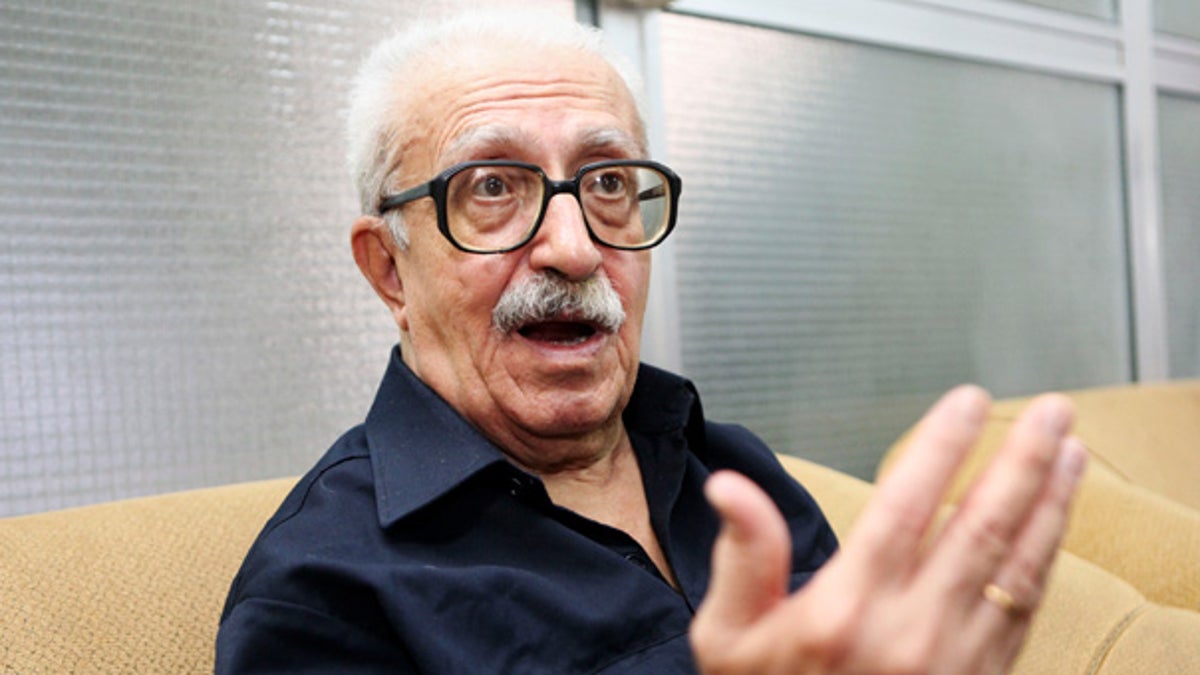
Sept. 5, 2010: Tariq Aziz, former Iraqi foreign minister and deputy prime minister speaks to the Associated Press in Baghdad. (AP)
BAGHDAD – Iraq's president declared on Wednesday that he will not sign off on the hanging of Tariq Aziz, joining the Vatican and others in objecting to the death sentence for a man who for years was the international face of Saddam Hussein's regime.
President Jalal Talabani's statement sets up a showdown between those seeking maximum punishment for key figures of the ousted regime and groups calling for reconciliation after years of fierce sectarian conflict unleashed by the 2003 U.S.-led invasion.
"I feel compassion for Tariq Aziz because he is a Christian, an Iraqi Christian," Talabani, a Kurd, told France's 24 TV. "In addition, he is an elderly man — aged over 70 — and this is why I will never sign this order."
However, Talabani's opposition does not necessarily mean Aziz, 74, will escape the noose. Aziz was sentenced in October for his alleged role in a campaign of persecuting, killing and torturing members of Shiite opposition and religious parties that now dominate Iraq.
The Iraqi constitution says death sentences must be ratified by the president before they can be carried out. But there are mechanisms to bypass the president — such as an act of parliament or the approval of one of Talabani's deputies.
Justice Ministry spokesman Abdul-Sattar Bayrkdar told The Associated Press that death penalties can be carried out regardless of the president's refusal to sign an execution order.
"If the president refuses to sign an execution that is not a veto on a verdict," Bayrkdar said.
Although Talabani says the death penalty violates his socialist principles, many convicted criminals and members of the former regime — including Saddam himself — have been executed during his presidency.
Talabani has tried to block only one proposed execution — that of Saddam's defense minister, Sultan Hashim al-Taie, a popular figure among the country's Sunni minority. Al-Taie, who was sentenced to death three years ago, is still alive.
It is unclear whether Talabani will follow up his comments Wednesday with a vigorous campaign to save Aziz's life.
The decision to prosecute and execute members of Saddam's Sunni-dominated Baathist regime was popular among majority Shiites, who now control the government. The regime sent hundreds of thousands of opponents to death or exile. Many Shiites want vengeance.
"I support Aziz's execution as any other criminal's whose hands are stained with the Iraqi people's blood," said Zaid Ghalib, a shop owner in Baghdad's Shiite slum of Sadr City.
But although Aziz is Christian and not Sunni, many Sunnis view his conviction and those of other former regime members as proof they'll forever be held responsible for actions carried out years ago.
"The ignorant people running this government came (to power) for revenge only," said Hussam Ahmed, a resident of Baghdad's predominantly Sunni district of Azamiyah.
Aziz's family has argued that he was not responsible for the crimes for which he's accused but is being persecuted simply because he was a member of Saddam's regime.
"I want to reassert that my father's execution sentence was a political decision. Therefore, it's null and void," said Aziz's son, Ziad, speaking from neighboring Jordan. "As a family, we thank the president and we appreciate his decision."
The Vatican expressed "great satisfaction" at Talabani's comments, calling it a step forward for human rights.
Hakim al-Zamili, a recently elected member of parliament from a bloc led by anti-American Shiite cleric Muqtada al-Sadr, questioned whether Aziz's Christianity made him a more sympathetic figure in the West.
Al-Zamili noted that the Vatican and Western leaders have publicly lobbied to spare Aziz's life while other death sentences get carried out with little fanfare. Islamic militants have been increasingly targeting Iraq's dwindling Christian minority; an Oct. 31 attack on a Sunday Mass service left 68 people dead at a Baghdad church.
Aziz was the highest-ranking Christian in Saddam's inner circle. He became internationally known as the dictator's defender and a fierce American critic as foreign minister after Iraq's invasion of Kuwait in 1990 and later as a deputy prime minister who frequently traveled abroad on diplomatic missions.
His meeting with then-Secretary of State James A. Baker in Geneva in January 1991 failed to prevent the Gulf War.
Aziz met with the late Pope John Paul II at the Vatican just weeks before the March 2003 U.S.-led invasion in a bid to head off that conflict.
The Oct. 26 death sentence came two months after Aziz was transferred from U.S. to Iraqi custody. Aziz's lawyers have not yet appealed the sentence but said they would do so in the eight days they have left.
Aziz, who surrendered to U.S. forces about a month after the war started, has already been convicted in two other cases, receiving a combined 22 years in prison. In an interview with The Associated Press this summer, he predicted he would die in prison.
___
Associated Press writers Rebecca Santana, Hamid Ahmed and Saad Abdul-Kadir in Baghdad and Jamal Halaby and in Amman, Jordan contributed to this report.
